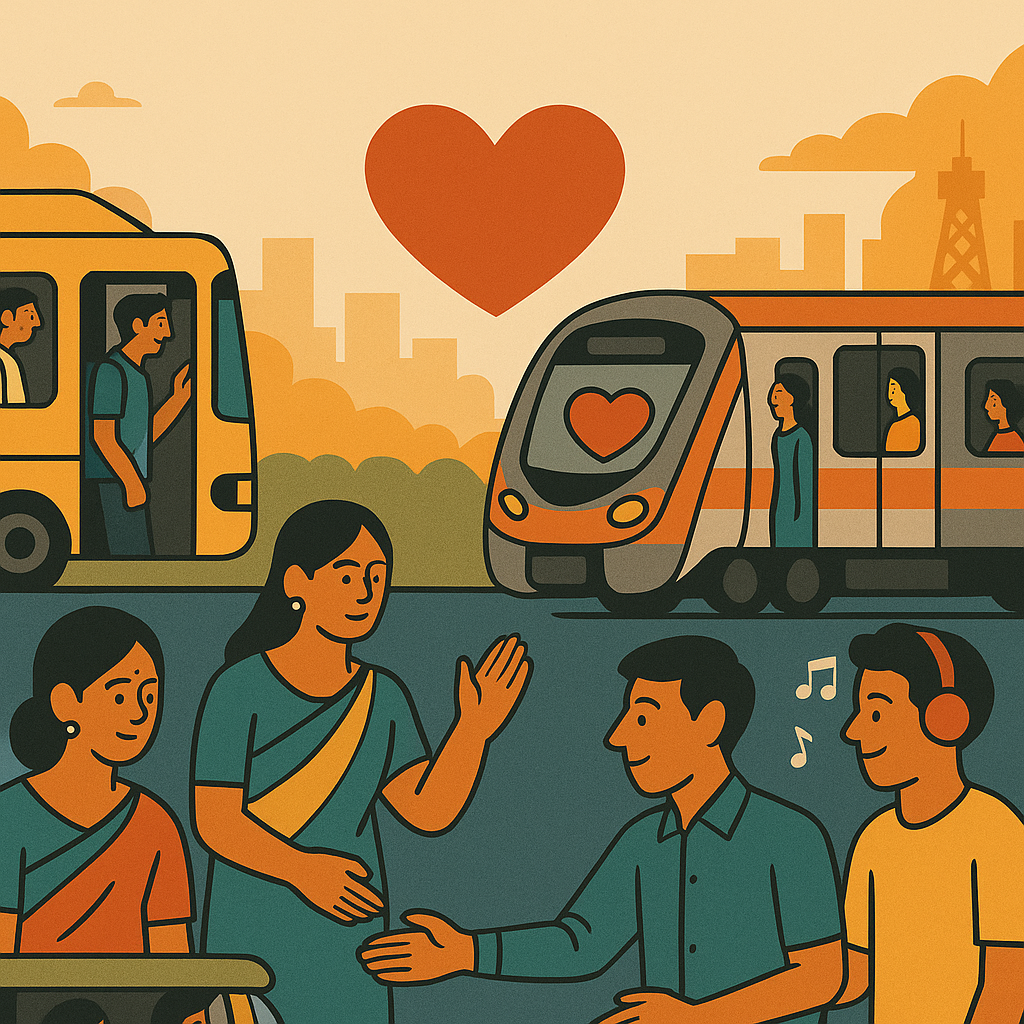TRAVEL WITH HEART
RETHINKING HOW WE COMMUTE IN INDIA

In a country where over 20 million people take public transport every single day, commuting is more than just getting from point A to B — it’s a shared experience, a daily social contract. Buses, metros, trains, and auto-rickshaws are the arteries of urban India, connecting lives and livelihoods.
Yet too often, this shared journey is marred by overcrowding, disorder, and a lack of consideration for others. As our cities grow and networks expand, perhaps it’s time we pause and ask: are we travelling ethically?
At the core of travel ethics lies a simple idea: respect. Respect for space, time, silence, and above all, for each other.
Respecting Space, Especially When There’s Little of It
If you’ve ever been on a rush-hour train in Mumbai or a packed metro in Delhi, you know how quickly public transport can become overwhelming. In such moments, small actions speak volumes. Holding your backpack close, avoiding unnecessary pushing, not crowding the doors — these aren’t heroic acts. They’re signs of empathy in motion.
The Art of the Queue
In many parts of the world, standing in line is second nature. In India, however, skipping queues has become almost a cultural blind spot. But what seems minor — cutting a line or pushing ahead chips away at fairness and equality. Honouring a queue isn’t about being rigid; it’s about acknowledging that everyone’s time matters.
Reserved for a Reason
Designated seats for women, the elderly, and people with disabilities are a step toward inclusivity. Yet, they are too often ignored. Giving up a seat doesn’t cost much, but it earns a lot. It’s not charity; it’s simply choosing decency over indifference.
Quiet, Please — We’re All in This Together
Public transport is a shared space, not a stage. Loud phone calls, booming music, or heated debates can turn a long commute into a sensory overload. A little awareness — like using headphones or speaking softly can make the ride better for everyone.
Clean Spaces, Clear Minds
Despite the signs and campaigns, littering in public transport is far too common. Cleanliness isn’t just the job of cleaning staff, it’s a collective responsibility. Think of buses and trains not as public property, but as shared living rooms. Would you toss garbage in yours?
Safety and Dignity for All
Perhaps the most critical aspect of ethical travel is ensuring safety, especially for women. Unwanted attention, inappropriate behavior, or physical intrusion are unacceptable. A respectful commute is a safe commute and that safety begins with self-awareness and restraint.
There Is Hope, And It’s Already Among Us
Still, amid the chaos, there are everyday heroes. The young man who helps an elderly woman board, the stranger who offers directions, the person who gives up their seat without being asked. These small, beautiful acts remind us that change is possible and already happening.
The Road Ahead
Public transport isn’t just infrastructure, it’s a reflection of our collective character. Ethical commuting doesn’t demand perfection. Just a bit more patience. A little more kindness. And a lot more awareness.
Let’s travel not just to reach, but to grow together.

Hands United for Lifelong Aid and
Human
Upliftment Lever Foundation
Since 2012
ALL CONTACTS
-
Registered Office:
1/5 Parel Shivshandesh CHSL., Kasturba Gandhi Nagar, LR Papan Marg, Worli, Mumbai 400018. -
Branches:
Worli, Charni Road, Kalyan, Pune - +91-8082376061 , +91-8369001611
- hulahulgrp@gmail.com
SUPPORT US
If you wish to contribute to our mission, you can make a donation via bank transfer to the following account:
Bank Details
Name: HULAHUL Foundation
Bank: IDBI Bank
Account Number: 0026104000273299
IFSC Code: IBKL0000026
Branch: Prabhadevi


Leave a Reply